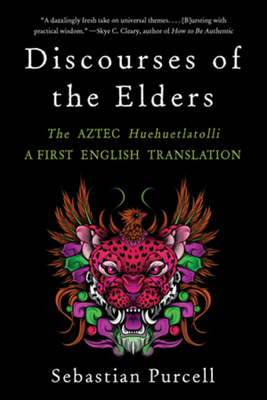Discourses of the Elders: The Aztec Huehuetlatolli a First English Translation

Discourses of the Elders: The Aztec Huehuetlatolli a First English Translation
Western philosophers have long claimed that God, if such a being exists, is a personal force capable of reason, and that the path to a good human life is also the path to a happy one. But what if these claims prove false, or at least deeply misleading? The Aztecs of central Mexico had a rich philosophical tradition, recorded in Latin script by Spanish clergymen and passed down for centuries in the native Nahuatl language--one of the earliest transcripts being the Huehuetlatolli, or Discourses of the Elders, compiled by Friar Andrés de Olmos circa 1535.
Novel in its form, the Discourses consists of short conversations between elders and young people on how to achieve a meaningful and morally sound life. The Aztecs had a metaphysical tradition but no concept of "being." They considered the mind an embodied force, present not just in the brain but throughout the body. Their core values relied on collective responsibility and group wisdom, not individual thought and action, orienting life around one's actions in this realm rather than an afterlife, distinctly opposed to the Christian beliefs that permeate Europe and America.
Sebastian Purcell's fluency in his grandmother's native Nahuatl brings to light the Aztec ethical landscape in brilliant clarity. Never before translated into English in its entirety, and one of the earliest post-contact texts ever recorded, Discourses of the Elders reflects the wisdom communicated by oral tradition and proves that philosophy can be active, communal, and grounded not in a "pursuit of happiness" but rather the pursuit of a meaningful life.
PRP: 117.52 Lei
Acesta este Prețul Recomandat de Producător. Prețul de vânzare al produsului este afișat mai jos.
94.02Lei
94.02Lei
117.52 LeiLivrare in 2-4 saptamani
Descrierea produsului
Western philosophers have long claimed that God, if such a being exists, is a personal force capable of reason, and that the path to a good human life is also the path to a happy one. But what if these claims prove false, or at least deeply misleading? The Aztecs of central Mexico had a rich philosophical tradition, recorded in Latin script by Spanish clergymen and passed down for centuries in the native Nahuatl language--one of the earliest transcripts being the Huehuetlatolli, or Discourses of the Elders, compiled by Friar Andrés de Olmos circa 1535.
Novel in its form, the Discourses consists of short conversations between elders and young people on how to achieve a meaningful and morally sound life. The Aztecs had a metaphysical tradition but no concept of "being." They considered the mind an embodied force, present not just in the brain but throughout the body. Their core values relied on collective responsibility and group wisdom, not individual thought and action, orienting life around one's actions in this realm rather than an afterlife, distinctly opposed to the Christian beliefs that permeate Europe and America.
Sebastian Purcell's fluency in his grandmother's native Nahuatl brings to light the Aztec ethical landscape in brilliant clarity. Never before translated into English in its entirety, and one of the earliest post-contact texts ever recorded, Discourses of the Elders reflects the wisdom communicated by oral tradition and proves that philosophy can be active, communal, and grounded not in a "pursuit of happiness" but rather the pursuit of a meaningful life.
Detaliile produsului









